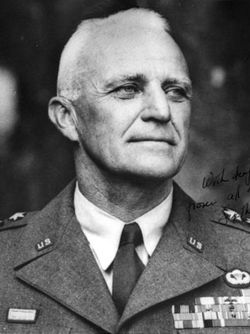Monuments
11th Airborne Division- Tagaytay Ridge Airborne Landing Marker
11th Airborne Division- Los Baņos Raid Marker
US-Filipino Amphibious Landing at Nasugbu Memorial

Joseph Swing commanded the 11th Airborne Division in the Pacific Theater during WW2. His remarkable life can be best summarized from the December 12, 1984 New York Times OBITUARY:
Lieut. Gen. Joseph May Swing, commanding officer of the 11th Airborne Division in World War II and later Commissioner of the Immigration and Naturalization Service, died of pnuemonia Sunday in San Francisco, where he resided. He was 90 years old.
General Swing was a native of Jersey City and was graduated from the United States Military Academy in 1915, a classmate of Dwight D. Eisenhower and Omar N. Bradley. The general's military career spanned 51 years.
One of his first assignments as a second lieutenant in the Fourth Field Artillery, Texas, was the expedition to Mexico led by Gen. John J. Pershing against Francisco (Pancho) Villa, the Mexican revolutionary.
He fought in France as a field-artillery captain in World War I. Commanded Airborne Unit
After years as an artillery expert, he organized the artillery units of the 82nd Airborne Division at Fort Bragg, N.C., as the United States entered World War II. For much of the war, he commanded the 11th Division, which was activated as an airborne unit.
He was promoted to major general in 1943.
General Swing conducted the first mass landing of parachute and glider troops at night with the 11th Airborne division at Camp Claiborne, La. He was transferred to the Pacific in 1944, and his paratroopers were credited with helping to defeat the Japanese at New Guinea and in the Phillipines.
After the Japanese surrender, his was the first United States unit to occupy Japan.
Returning to the United States in 1949, he was commandant of the Army War College at Fort Leavenworth, Kan., in 1950 and 1951, and later commanded the Sixth Army at the Presidio until he retired in 1954. Work With Immigration Service
General Swing served as Commissioner of the Immigration and Naturalization Service from 1954 to 1962, when he retired for the second time. He believed that the greatest accomplishment of his tenure was a sweeping reorganization in which many of the service's functions were decentralized.
Among General Swing's medals were the Distinguished Service Cross, the Distinguished Service Medal, the Silver Star with two oak leaf clusters, the French Legion of Honor, the Air Medal with one cluster and the Legion of Merit.
